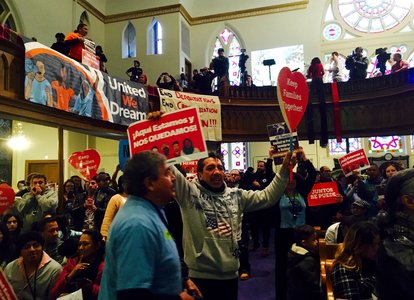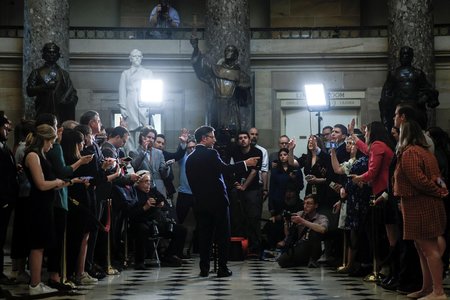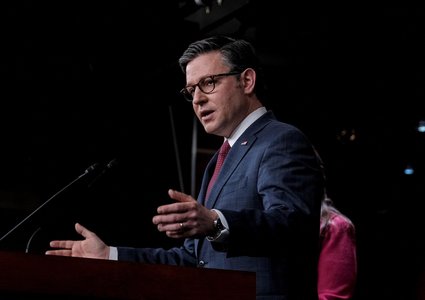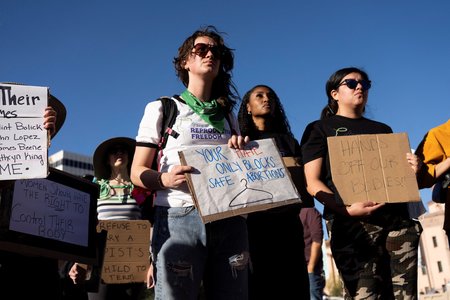President Trump riled up conservative voters in a fiery speech at CPAC Friday where he took on his favorite foil -- the press. After one month in the Oval Office, is Trump changing the core of the Republican Party? All week long Republican lawmakers have seen voter frustration up close in boisterous town hall meetings across the country as voters upset about the Affordable Care Act confront Congress directly. From immigration to transgender bathroom rights to rising anti-Semitism, the culture wars are heating up in America's heartland.
Full Episode: Is President Trump redefining the Republican Party? Plus, angry voters voice discontent in town halls.
Feb. 24, 2017 AT 9:25 p.m. EST
TRANSCRIPT
Notice: Transcripts are machine and human generated and lightly edited for accuracy. They may contain errors.
ROBERT COSTA: This is not your father’s Republican Party. I’m Robert Costa. We examine how President Trump is ushering in a new political order, tonight on Washington Week .
PRESIDENT DONALD TRUMP: (From video.) We will reduce your taxes. We will cut your regulations. We will support our police. We will defend our flag. We will bring back our jobs and our dreams. And, by the way, we will protect our Second Amendment. (Cheers, applause.)
MR. COSTA: Conservatives rally behind President Trump at the annual CPAC conference, reassured he is not backing down from his hardline campaign promises.
PRESIDENT TRUMP: (From video.) Our victory was a victory and a win for conservative values.
MR. COSTA: Declaring war on the media and opposition forces, the president’s chief strategist vows to deconstruct the administrative state.
STEPHEN BANNON (White House chief strategist): (From video.) If you think they’re going to give you your country back without a fight, you are sadly mistaken.
MR. COSTA: Outside Washington –
TOWN HALL ATTENDEE: (From video.) You work for us.
AUDIENCE MEMBERS: (From video.) Do your job!
TOWN HALL ATTENDEE: (From video.) You’re a chicken!
TOWN HALL ATTENDEE: (From video.) Obamacare saved my life.
TOWN HALL ATTENDEE: (From video.) Please, please, please don’t repeal it.
MR. COSTA: Lawmakers face protests and pushback from constituents.
TOWN HALL ATTENDEE: (From video.) 2020 you’re gone!
SENATE MAJORITY LEADER MITCH MCCONNELL (R-KY): (From video.) It’s pretty clear what they are protesting, and that’s the outcome of last year’s election.
TOWN HALL ATTENDEE: (From video.) Senator, we’re not protesting the election. We’re protesting right to work. We are protesting losing our health care. We are protesting Russian interference in the White House.
MR. COSTA: We explore the Trump doctrine with Molly Ball of The Atlantic , Dan Balz of The Washington Post , and Julie Hirschfeld Davis of The New York Times .
ANNOUNCER: Celebrating 50 years, this is Washington Week .
Once again, from Washington, Robert Costa of The Washington Post .
MR. COSTA: Good evening. Donald Trump was greeted with cheers and multiple standing ovations during his first appearance as president at CPAC. As the de facto leader of the conservative movement, the president reaffirmed his commitment to a nationalist agenda.
PRESIDENT TRUMP: (From video.) There is no such thing as a global anthem, a global currency or a global flag. This is the United States of America that I am representing. (Cheers, applause.) I’m not representing the globe, I’m representing your country.
MR. COSTA: The president began his speech raging against his favorite enemy, the “fake news” media. He went on to talk about dismantling Obamacare and stopping illegal immigration. Last year the president skipped CPAC. This year he was welcomed like a returning hero. Dan, is this a vivid example of how power unites the right?
DAN BALZ: It was extraordinary to see what happened this week with the embrace that he got, not simply because he skipped CPAC last year, but as we went through the election, we all talked about and wrote about the likely civil war that would break out within the Republican Party, almost whether Donald Trump won or lost. We’ve seen just the opposite, at least on the surface. And what we were reminded of is the degree to which one person, like Donald Trump, has the ability to redefine almost everything, and certainly to redefine the Republican Party as we have known it for a generation.
MR. COSTA: Julie, does the White House expect this unity among Republicans to last, especially as President Trump heads to Congress next week to give his address?
JULIE HIRSCHFELD DAVIS: Well, I think that’s certainly the aim of this address and really the aim of this first few weeks – his first few weeks in office. He is sort of presenting himself as a man of action. He’s going to take action on all of these issues that Republicans have for so long wanted to see action on – repealing Obamacare, doing a big tax cut, you know, and sort of cutting regulation, all of the things that they have such a pent-up appetite for. And if you see – if you talk to Republicans on Capitol Hill right now, you see that they really are hopeful that this can happen. I think there are a lot of doubts, though, and a lot of questions about whether this president is going to be able to actually execute on this ambitious of an agenda, and there really isn’t much specificity yet in terms of how he wants to get these things done. The sequencing has been a question. Now they’re saying that they’re going to do health care first and tax reform later. But we still haven’t seen what this replacement is going to look like, and what we saw in those town halls that we were just looking at was that people are really concerned – and not just Democrats, but also Republicans – how their constituents are going to react to whatever it is the White House puts forward on that.
MR. COSTA: And it’s not just health care and taxes. Molly, left unmentioned in that list is this deconstruction of the administrative state, the phrase used by White House Chief Strategist Steve Bannon. Is the Republican Party in Washington, are they with President Trump and Bannon when it comes to this nationalism that was so strident at CPAC?
MOLLY BALL: Well, yes and no. I mean, one thing that was interesting about CPAC was that you did not have almost any Republican members of Congress there. I believe Ted Cruz was the only senator to speak, and many others turned down invitations because the face of the party has changed so much and because they have seen how, according to the base of the party, according to actual Republican voters, conservatism is whatever Donald Trump says it is, and that can actually change from one day to another.
Now, the deconstruction of the administrative state, if you’re just talking about deregulation, scaling back the federal agencies’ roles in things, that’s something that I think Republicans can agree on. Republicans in Congress agree with the administration. They have largely been with one voice behind all of the Cabinet nominees, whose role in their agencies they largely see as scaling back what they saw as an overly meddlesome executive branch in areas like environmental protection and the federal Department of Education. It is a conservative principle to scale back those agencies’ role. They felt that the Obama administration made those agencies too aggressive. Where they don’t agree is on things like immigration, on things like trade, on things like our government’s posture toward Russia. And so you have a Congress that, as Julie said, is really waiting for signals from an administration that hasn’t given real concrete signals.
MR. COSTA: Who’s got the power, Dan? If you’re a congressman or a senator, a Republican, are you listening to Vice President Pence, who you’ve written about a lot, and his influence on Capitol Hill, or is it Steve Bannon who’s really directing the agenda?
MR. BALZ: Well, you want to listen to Vice President Pence because Vice President Pence is your link to that White House, and a trusted link up on Capitol Hill because of his time there and because he is a much more conventional conservative than Donald Trump, who is all over the lot ideologically. But as you – as you watched CPAC, you would have to say that the intellectual architect of the Trump administration, or certainly the biggest intellectual influence on Donald Trump, is Stephen Bannon. And if you are a conventional Republican in any general sense of that word, that will make you nervous because he has a worldview that is contrary to what the – what the Republican Party of the last 40 years has been about.
MR. COSTA: And, Julie, one of the things Bannon said at CPAC is that the media remains the opposition party, and then you had the president come to CPAC this morning and talk about the media as the enemy. Is this an experience of inexperience at the White House? Are they reacting to all this media scrutiny, or it is actually a strategy to make the media an opposition party?
MS. DAVIS: I think it’s much more of a strategy. And I think actually this week we saw it sort of progress in a much more sort of orderly way than we may have in the past. You know, it’s been offhanded comments by the president, a tweet here, you know, a comment at a pool spray there. But I mean, here you had Steve Bannon come to CPAC and say, you know, the media is the opposition party, and it’s only going to get worse. The next morning we had Donald Trump come and, you know, unleash this, you know, very aggressive attack on fake news. He charged that reporters are making up sources, that you know, it’s not to be believed, they’re just trying to hurt him, it’s very dishonest, it’s very cunning – you know, that’s it’s a strategic attempt to undermine him. And then, you know, a few hours later at the White House, Sean Spicer, the White House press secretary, limited what is usually an on-camera daily briefing to an off-camera briefing in his office with a select group of reporters, which did not include The New York Times , which did not include CNN, whose coverage the president has taken great issue with. It didn’t include Huffington Post or POLITICO or a lot of the other mainstream publications that cover this White House. But it did include Breitbart, which Steve Bannon used to be the head of. It did include One America News. It did include Fox News. And so what you're seeing is, I think, a very strategic decision that, you know, the press is our foil here and we're going to aggressively go after it. And it's – and it’s a way of undercutting outlets that maybe doing coverage of the White House they find unflattering. It's easier to say it's all lies and it’s all fake than to say, you know, OK, well here's our side of the story and that’s – you know, we disagree.
MR. COSTA: So real quick, from everyone, as we saw what happened at the White House today with some organizations being banned, you really wonder who’s actually running this Trump White House. Is it Chief of Staff Reince Priebus? Is it Bannon? And we had this buddy routine from them at CPAC. Does anyone buy that this is a legitimate partnership governing together at the White House? Or is this just something that’s convenient for politics, Molly?
MS. BALL: There are competing powers centers in this in the White House, no question. And it's has always been Trump's M.O. in his business, his campaign and now in the White House to have these competing power centers around him and to pit them against each other to some extent. And it's possible that that may be a fruitful management style on some level in terms of getting the best work out of people. But it – there's going to have to be decisions on some of these things.
And when you do have one part of the White House that is towing a more conventional Republican line – and that’s certainly Reince Priebus’ point of view – and one part, you know, more in the Bannonite end of things, and they're putting, in some cases, competing executive edit – orders under the president's nose and having him decide in the moment what to sign sort of on a whim, that becomes a very difficult way to run an actual country. And we’ve seen them have a lot of challenges in that regard just because the chaos is affecting their ability to get results. And it's going to affect their ability to get their agenda through Congress once they – when and if they get one, and their ability to do big things even through the executive branch, like the – like the travel ban that they had to pull back.
MR. COSTA: And while the president was being cheered at CPAC, Republican lawmakers – they were facing a revolt of angry constituents attending town hall meetings. Many of the people who were concerned about the Republican plan to repeal and replace Obamacare, there were many of them at town hall meetings. But there's another, Former House Speaker John Boehner.
FORMER HOUSE SPEAKER JOHN BOEHNER (R-OH): (From video.) All this happy talk that went on in November and December and January about repeal, repeal, repeal – yeah, we'll do replace and replace. I started laughing, because if you pass repeal without replace, first, anything that happens is your fault. You broke it. But most of the Affordable Care Act, the framework is going to stay there.
MR. COSTA: Molly, what's fueling this newfound activism out there?
MS. BALL: The activism at the town halls I think is largely organic. Now, the president and others have said that this is all paid protesters, that they're all being ginned up by, you know, George Soros and the teachers' unions. But you cannot buy protests this big, both because it would cost too much money and because this kind of passion only comes when people are really excited about something. Now, there was a progressive movement in this country before Donald Trump got elected. And many of those organizations are now trying to piggyback on the grassroots anger that's out there. But I think very similar to the Tea Party in 2009, there is a legitimate organic groundswell of public anger out there and it's flooding these town halls.
MR. COSTA: But, Dan, do the Democrats see an ability here to take advantage politically of all this grassroots energy on the left? There's a race ongoing right now for Democratic National Committee chairman. And it seems like the Democratic Party’s still trying to figure out its future.
MR. BALZ: Well, I think the Democratic Party leadership has been surprised by what’s happened since Donald Trump was sworn in. I mean, the size the Women's March the day after the inauguration was way beyond what anybody saw and expected. And what we have seen since then is that that kind of passion – if you talk to members of Congress, they will say they are getting more response in their offices – they'll send out a survey on an issue, like the Affordable Care Act. The response is way over the top of what they expected. What we're seeing at the town hall meetings, way beyond what people would have expected. It's forced the Democratic leadership to recalibrate what they do.
So the first issue is, how much can they cooperate with Donald Trump? I would say, and I think everybody would agree, much less today than they might have thought six weeks ago. It's going to be painful for anybody who looks like they're cooperating too much with Donald Trump. That’s one issue. But the bigger issue, which you raise, is what happens to this energy? Can it be sustained into 2018 and the midterm elections? And I think that Democrats – Democratic leaders are trying to figure out how do you perpetuate that? Will it be self-generating for that much time?
MR. COSTA: Julie, what do you make of the White House as they look at these town halls? Is it a threat to their agenda in Congress as some of these senators and congressmen face hostile attendees?
MS. DAVIS: I think what the White House is seeing is sort of the proof of what they're hearing privately from some members of Congress, when they say, listen, you know, we can't just go out there with repeal and nothing to replace it with, as John Boehner said in that clip. I mean, it's very revealing. Now, Donald Trump keeps saying, you know, if I wanted to I could just leave Obamacare in place and just have it collapse and blame it all on the Democrats. And that would be just fine, but I don't want to do that because that's – you know, that's not good for the country. But the reality is that he knows he has to, you know, come up with a solution. The White House knows that that is what is expected of them.
And what is not clear is whether Republicans on the Hill are going to step forward and say, listen, we've heard this from our constituents, here's what we think we need to do, and the White House is going to take that and run with it, or if the White House is going to say, OK, here's what you need to do, and we're going to go out there with you and help you sell it. Now, Donald Trump has said, you know, I'm going to campaign in the midterm elections and I’m going to campaign against Democrats who try to block us, I’m going to, you know, help the Republican cause. But I think that, you know, what these town hall meetings say to the White House is there is a huge political price to be paid if they get this wrong on health care, and they may already be paying it, essentially. So the longer they wait, the more they pay. (Laughs.)
MR. COSTA: Just a quick follow up. Based on your reporting, is Speaker Boehner right? Do many Republicans privately, in the White House perhaps, at least on Capitol Hill, do they think maybe a full repeal and replace on health care is impossible, or this grand promise isn't going to be able to be fulfilled?
MS. DAVIS: I think some Republicans are concerned about that. I do think Republicans leaders think that this can be done, that there’s a way to do it. But I don't think that they've reached that consensus yet of what that looks like. And without leadership from the White House, it's difficult to do. I mean, you would think at the beginning of a presidency that there would be the political capital there to say, OK, we're going to go bold and here's what it's going to be and we're going to help you sell it. But until there's something to sell, I think Republicans are really – there's a question in their minds whether they're going to have the backup that they need to get some of this done. And I don't think they're going to be willing to go forward, as Boehner said, with repeal unless there's a very robust plan that they think will work on replace.
MR. COSTA: Well – yes.
MR. BALZ: One of the forces in this battle are the governors, who are in town this weekend. And we were told today that Hill Republicans have been talking to Republican governors on the Medicaid piece of it, what to do about that. And they're still absent a consensus on that. And that the governors feel that that's a very important element for them. They want to weigh in. They want a voice on it.
MR. COSTA: Do you think they'll pull aside the president on Sunday night at that event?
MR. BALZ: I would guess some of them will. And I suspect that John Kasich, the Ohio governor, who was in to see the president today – my guess is that he raised this issue with him during that meeting.
MR. COSTA: Many governors are in Washington to meet with the president at the White House. But health care is not the only issue causing that’s causing this administration some headaches. And this isn't the only issue on Americans’ minds. The president’s executive orders rolling back LGBT protections and his new aggressive immigration guidelines have sparked protest. Molly, we've seen some real tension – I'd like to get Julie in on this as well, and Dan of course. Is this Trump Cabinet – with Attorney General Sessions and Secretary DeVos and the Department of Education – even within Trump’s Cabinet there's been some active debate about whether rolling back these LGBT rules makes political sense and even moral sense.
MS. BALL: That's right. And reportedly within the administration you did have the sort of Sessions wing advocating for this rollback of the Obama protections for transgender kids. And Betsy DeVos, who, despite her reputation as a quite conservative – including socially conservative – person, is friendly to LGBT issues and didn't want this to happen.
And so this an example of an issue that is a huge cultural flash point, and where, you know, the social conservatives who are very well-organized within the Republican Party, within the conservative movement, they want this White House to do their bidding. They feel they got Trump elected and now they deserve things in return. But there are other schools of thought, even within the administration, even within the White House. And with a president, again who hasn't been in politics and doesn't have a well-articulated ideology, you end up with that squabbling that can sort of go either way.
MR. COSTA: And the squabbling is happening, but in politics we track who is winning. And it seems, Julie, like Attorney General Sessions, this confidant of President Trump, he’s deeply shaping policy, not just on LGBT rules but on immigration.
MS. DAVIS: Absolutely. I mean, Jeff Sessions certainly came out of this debate over transgender bathrooms on top. He basically – which was interesting, because Donald Trump himself has been fairly open to LGBT rights. And he made a comment during the campaign about – or during the transition about Caitlyn Jenner being welcome to use whatever restroom she wanted in Trump Tower. And yet, he came out on the side of Jeff Sessions and Betsy DeVos was on the other side.
On immigration, for sure. I mean, you can see the fingerprints of Jeff Sessions on all of the executive orders. There have now been – there now have been three of them. There’s been the wall, the interior enforcement, and this travel ban that’s getting rewritten, we think, and will be out and will be out next week again, that’s under legal challenge.
But, you know, Jeff Sessions has been working on those issues for a long time, had been in the Senate. His views on those issues were seen as rather fringe, even by Republicans, that he was really, really far to the right on being hardline and you know, deportations and cracking down. And this is actually the policy now and it's, I think, largely driven by him. Of course, his former aide is now a very senior domestic policy advisor at the White House.
MR. COSTA: Stephen Miller?
MS. DAVIS: Steve Miller. And of course, we know Steve Bannon agrees with this as well. But I do not think you can understate – or, overstate Jeff Sessions' influence right now in shaping the policies of this White House.
MR. COSTA: Dan, we know Attorney General Sessions is an ideologue, a conservative. But President Trump didn't really run on ideology. What are the consequences for a first-term president, an outsider, really adopting some of these more right-wing policies early on? Does that mean it’s going to be harder for him to moderate later? Is he really putting his reputation in a hard way early on?
MR. BALZ: Well, on immigration he's basically where Sessions is for the most part. On LGBT issues, not at all. I mean, if you remember what he said at the Republican Convention, he was much friendlier on the idea of anti-discrimination issues to the LGBT community. So there's a balancing act that he's having to weigh as he makes these decisions. You know, the LGBT issue – I suspect their calculation is that's better for them to go in that direction than not because that part of the Republican base desperately wants to see that shift take place.
On immigration, I mean, you have this – you know, this cleavage in the country over this immigration issue. For Trump supporters – if you talk to Trump supporters, one of the basic things is keep the border secure, get the bad people out. I mean, the kind of language that Donald Trump uses resonates and connects directly. And yet, given the actions that they’ve taken and kind of the uncertainty as to how this enforcement process is unfolding – because there’s still a lot of uncertainty about it – it’s created within the minority community, within the Latino community, great fear, great nervousness, a sense – you know, a sense that they’re coming to get us. And that’s a very volatile situation for Donald Trump, who has claimed he wants to do it humanely and yet the language and the forward motion of it suggests something else.
MR. COSTA: But he knows that he also has some other issues to deal with. We’ve talked all this week about nationalism and these rising issues in the country because we’re in a disruptive time, but there are some ugly issues. And this administration is grappling with a number of them on several fronts in its early days, including a wave of bomb threats against synagogues and Jewish community centers. Molly, why is this happening now, this anti-Semitism we’ve seen across the country? And we’ve seen President Trump have to deal with it and address it in his own way. He took some time to deal with it.
MS. BALL: Well, that is the question, is why it is happening, because you know, Jewish groups are reporting that there is a wave of threats that they – it is higher than what they’ve seen before. You know, there was anti-Semitism in this country before this presidential election, and it has been for a long – anti-Semitism has been for a long time by far the largest number of religiously motivated hate crimes. So it is not the case that this didn’t exist before Donald Trump came along, and his administration feels that these constant demands for him to disavow things, and if he doesn’t he’s encouraging them, they see that as political correctness that’s unfair. But there is a wave of incidents, and Trump has not been very forthright in disavowing them. And so the question is, is that where they are getting their motivation?
MR. COSTA: Great. Well, thanks, everybody. A great discussion. Wonderful to have you all here.
Just a reminder to watch the PBS NewsHour ’s coverage of President Trump’s address to a joint session of Congress next Tuesday, starting at 9 p.m. Eastern, 8 p.m. Central.
Also, Washington Week is celebrating a milestone few television programs have attained: this month marks the program’s 50 th anniversary. It seems like a good time to thank all of our faithful public television viewers for your support.
Be sure to check out the 10 biggest stories Washington Week has covered in its first 50 years, along with a special salute to one of the original staff members who’s still on the team. You can find that at PBS.org/WashingtonWeek.
We also want to take a moment to mark the passing of Ward Chamberlin, a longtime supporter of Washington Week . Mr. Chamberlin served as president and CEO of our producing station, WETA, for 14 years, from 1975 to 1989, and remained a strong advocate for public broadcasting. Ward Chamberlin was 95 years old.
(Pause.)
That’s all the time we have tonight, but our conversation continues on the Washington Week Extra . I’m Robert Costa. Good night.
FROM THIS EPISODE


Clip: Watching Washington Week for 50 years


Special: Latino activists fight Trump's agenda and Democrats search for new leader and path forward
MOST POPULAR


Full Episode: Washington Week with The Atlantic full episode, 4/19/24


Clip: Will Democrats rescue Johnson's speakership to protect aid for Ukraine and Israel?


Clip: Attacks in Israel and Iran bring more uncertainty to Middle East

Preview: Coming Up on Washington Week with The Atlantic


Full Episode: Washington Week with The Atlantic full episode, 4/12/24

© 1996 - 2024 WETA. All Rights Reserved.
PBS is a 501(c)(3) not-for-profit organization

